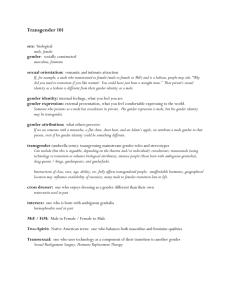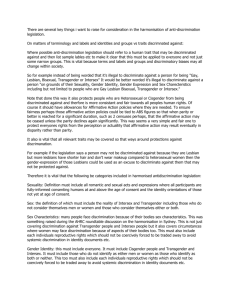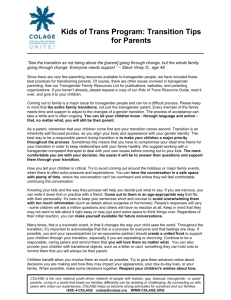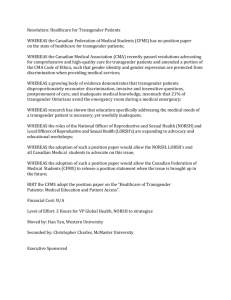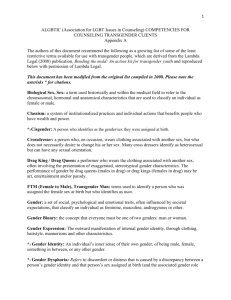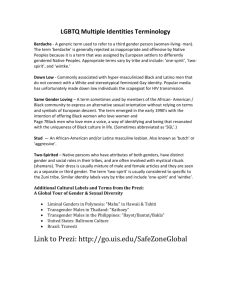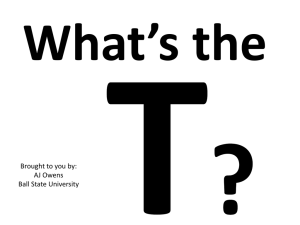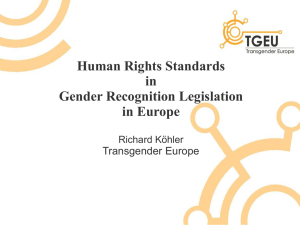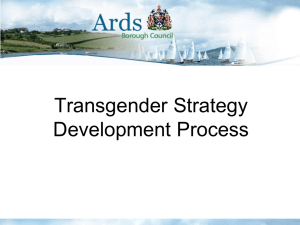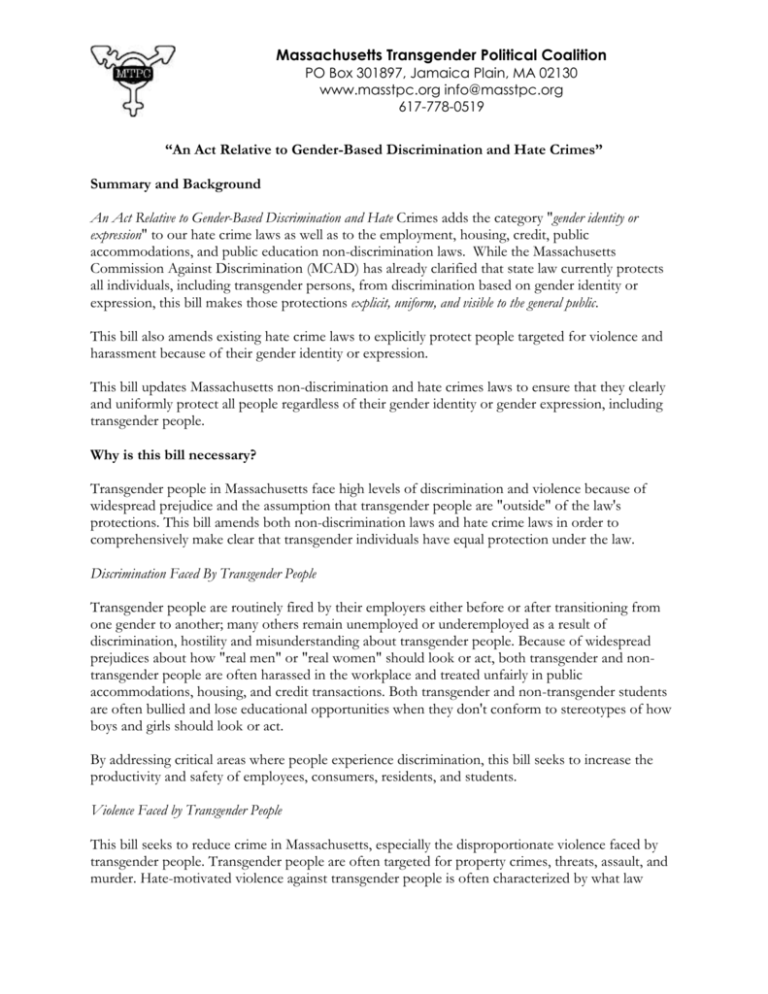
Massachusetts Transgender Political Coalition
PO Box 301897, Jamaica Plain, MA 02130
www.masstpc.org info@masstpc.org
617-778-0519
“An Act Relative to Gender-Based Discrimination and Hate Crimes”
Summary and Background
An Act Relative to Gender-Based Discrimination and Hate Crimes adds the category "gender identity or
expression" to our hate crime laws as well as to the employment, housing, credit, public
accommodations, and public education non-discrimination laws. While the Massachusetts
Commission Against Discrimination (MCAD) has already clarified that state law currently protects
all individuals, including transgender persons, from discrimination based on gender identity or
expression, this bill makes those protections explicit, uniform, and visible to the general public.
This bill also amends existing hate crime laws to explicitly protect people targeted for violence and
harassment because of their gender identity or expression.
This bill updates Massachusetts non-discrimination and hate crimes laws to ensure that they clearly
and uniformly protect all people regardless of their gender identity or gender expression, including
transgender people.
Why is this bill necessary?
Transgender people in Massachusetts face high levels of discrimination and violence because of
widespread prejudice and the assumption that transgender people are "outside" of the law's
protections. This bill amends both non-discrimination laws and hate crime laws in order to
comprehensively make clear that transgender individuals have equal protection under the law.
Discrimination Faced By Transgender People
Transgender people are routinely fired by their employers either before or after transitioning from
one gender to another; many others remain unemployed or underemployed as a result of
discrimination, hostility and misunderstanding about transgender people. Because of widespread
prejudices about how "real men" or "real women" should look or act, both transgender and nontransgender people are often harassed in the workplace and treated unfairly in public
accommodations, housing, and credit transactions. Both transgender and non-transgender students
are often bullied and lose educational opportunities when they don't conform to stereotypes of how
boys and girls should look or act.
By addressing critical areas where people experience discrimination, this bill seeks to increase the
productivity and safety of employees, consumers, residents, and students.
Violence Faced by Transgender People
This bill seeks to reduce crime in Massachusetts, especially the disproportionate violence faced by
transgender people. Transgender people are often targeted for property crimes, threats, assault, and
murder. Hate-motivated violence against transgender people is often characterized by what law
Massachusetts Transgender Political Coalition
enforcement personnel call "overkill": an excess of force. Over five percent of reported hate crime
victims from 2002-2005 were transsexual women and men, a number much greater than their
percentage of the Commonwealth's population.
What does “gender identity or expression” mean?
“Gender identity or expression” is defined as “a gender-related identity, appearance, expression, or
behavior of an individual, regardless of the individual’s assigned sex at birth.”
This definition is intended to be consistent with MCAD’s interpretation of existing law and reflects
the approach taken in a number of other states to ensure that transgender people are covered by the
law. In addition to covering transgender people, the law protects people who do not conform to
stereotypical views of how “real men” or “real women” should look or act.
How would this law affect hate crime laws?
Perpetrators of crimes that specifically target a person because of their gender identity or expression
would face penalties equal to those faced by criminals who target people because of race, religion,
ethnicity, disability, or sexual orientation.
Under the amended hate crime laws, individuals experiencing ongoing harassment and threats based
on their gender identity or expression would have the same ability to seek a civil injunction to
protect themselves as do individuals experiencing, for example, threats because of their race, sexual
orientation, or religion.
How would this law affect schools?
Transgender and non-transgender students are often bullied and even assaulted when their gender
expressions are different from what's expected of boys and girls. This law would make clear that it is
illegal for public schools to discriminate on the basis of a student’s gender identity or expression. It
would strengthen the ability of schools to protect students from violence.
Is Massachusetts the first place to explicitly protect people from discrimination on the basis
of gender identity or expression?
No. Many local and state governments have already enacted such protections. In Massachusetts,
ordinances in Boston, Cambridge, and Northampton prohibit discrimination on the basis of gender
identity or expression. Nationwide, 13 states, Washington D.C., and 102 cities and counties have
passed non-discrimination laws or ordinances protecting people on this basis. The states are
California, Colorado, Hawaii, Illinois, Maine, Minnesota, New Jersey, New Mexico, Rhode Island,
Vermont, and Washington.
Furthermore, over 155 employers based in Massachusetts as well as many who are operating in
Massachusetts have already adopted non-discrimination policies that include gender identity. Some
of these employers include:
American Express Co.
Bain and Company
Bank of America
Best Buy
Beth Israel Medical Center
Borders Group
2
Massachusetts Transgender Political Coalition
Bose Corp.
Brandeis University
Bridgespan Group
Bright Horizons Family
Solutions
Foley Hoag LLP
Giant Food
Gap
Global Hyatt Corp
Harvard Pilgrim Health Care
Harvard University
Hilton Hotels Corp
HSBC USA
John Hancock Financial
Services
The MassMutual Financial
Group
Merck
Mintz, Levin, Cohn, Ferris,
Glovsky & Popeo LLP
MIT
Novartis
Prudential Financial
Raytheon
Staples
State Street Corp.
Toys R Us
Trillium Asset Management
Tufts University
United States Postal Service
Wainwright Bank and Trust
Walgreens
WGBH Public Television
Nationwide, at least 3162 companies1 have adopted non-discrimination policies that explicitly
protect transgender people.
Isn't this kind of discrimination already covered by existing laws?
Yes, but protections for transgender people in Massachusetts derive from MCAD and court rulings and are not
explicitly stated in our laws. In addition to ensuring coverage of individuals who often face prejudice
and violence, the inclusion of "gender identity or expression" in our non-discrimination laws
achieves three other important goals:
o It makes a clear statement of statewide policy.
o It makes the scope of coverage clear to anyone who reads the laws or encounters training
materials related to them. While people with a legal background may already understand that
the laws cover transgender people, ordinary individuals may not be aware of this.
o It affirms the Commonwealth's commitment to fair treatment and freedom from crime and
violence for all its citizens.
Is Massachusetts the first place to include gender identity or expression in hate crimes law?
No. 10 states and Washington D.C. have included gender identity and gender expression in hate
crimes laws: California, Colorado, Connecticut, Hawaii, Maryland, Minnesota, Missouri, New
Mexico, Pennsylvania, and Vermont.
Doesn't our Gay Rights Law provide this explicit coverage?
Not necessarily. Sexual orientation as a legal concept is generally understood to refer only to
whether a person is homosexual, heterosexual, or bisexual. When transgender people face
discrimination it can be unrelated to their sexual orientation.
Moreover, some courts have said that sexual orientation laws do not prohibit discrimination because
of a person’s gender identity or expression. For example, the United States Court of Appeals for the
First Circuit has twice said that sexual orientation discrimination prohibitions do not extend to
protect people who experience discrimination because of their gender identity or expression.
Higgins v. New Balance, 194 F.3d 252 (1st Cir. 1999); Rosa v. Park West Bank, 214 F.3d 213 (1st
Cir. 2000).
###
1
Based on the 2008 HRC Corporate Index.
3

